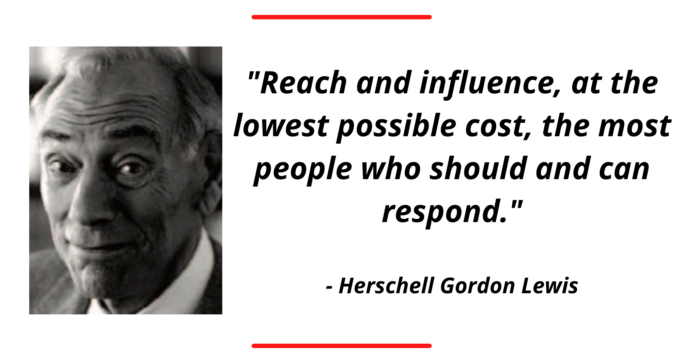It's easy for marketers to lose sight of what really matters. Creative minds shoot off in all directions, while the plethora of platforms can distract as well as solve. The timeless wisdom of the late Herschell Gordon Lewis ensures you focus your energy where it matters most.
Revisiting the Four Great Laws
Inevitably, as a marketer sophisticates his or her communications with both existing customers or clients and prospective customers or clients, sophistication leads to self-stroking.
Just as inevitably, self-stroking puts target individuals outside the mix, instead of squarely in the centre.
The Four Great Laws may be venerable… but they’re even more pertinent today than they were in prehistoric pre-web times, because the internet has speeded up reaction times for all force communication media.
Pertinence and recognition aren’t always in sync with each other.
A principal perpetration seeps from ‘creatives’ who write for their own interest groups, ignoring others, and becomes epidemic when the inevitable imitators decide: “Hey, that’s clever,” rather than: “Hey, that will sell.”
Much water has passed under the bridge since we listed the Four Great Laws in the pages of this publication some years ago. So, in the interest of both Internet-era clarity and Internet- savvy marketing acuity, it’s time to pass some more water.

The First Great Law
Reach and influence, at the lowest possible cost, the most people who should and can respond.
Basic?
Simple?
Obvious.
Glad you agree.
May all those whose marketing philosophy is the ancient notion of reaching ‘the most people’ whether qualified or not, and who think production out pulls message, re-think and join us in generating effective messages.
Note, please, that ‘lowest possible cost’ is a preventive against overproduction, not a plea for underproduction.
Killer Copy in a Crisis: Download our free eBook featuring the works of Herschell Gordon Lewis.
The Second Great Law
In this Age of Scepticism, cleverness for the sake of cleverness may well be a liability rather than an asset.
Cleverness for the sake of salesmanship?
Oh, yes.
Cleverness for the sake of telling the world how clever the creative team is?
Oh, no.
Our targets want not to believe. The web has given their natural scepticism a shot of adrenalin. Let’s not feed and enhance implicit scepticism by ‘Look at me!’ showing off.
The Third Great Law
E2 = 0. That’s it: When you emphasise everything, you emphasise nothing. So laundry lists should give way to selective sales arguments.
Choose and emphasise the key points and subordinate the rest.
The Fourth Great Law
Tell the reader/viewer/listener what to do.
Strange, isn’t it, that this, the easiest and clearest of all Four Great Laws, is the one most frequently violated?
Don’t just rhapsodise.
Imperative, regularly and rightly, out- pulls declarative. Repeat: Imperative out-pulls declarative. Tell your targets what to do. That applies to consumer, B2B and cries in the wilderness.
You already knew all those?
Excellent.
No mystery here. We’re not battling ignorance but, rather, dependence on tradition founded in itself rather than in testing and basic human psychology.
Let those who reject logic be our competitors.






Leave your thoughts